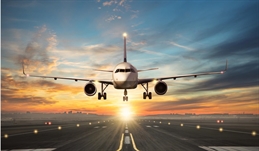Aviation
AAPA: CARGO TRAFFIC IN APRIL DOWN FOR SECOND MONTH AS GEOPOLITICAL TENSIONS, SUPPLY CHAIN ISSUES CONTINUED TO HIT
May 30, 2022

Asia Pacific airlines saw air cargo continue to post a decline in April as geopolitical tensions, inflationary pressures and persisting supply chain disruptions continued to weigh on growth.
The Kuala Lumpur-based Association of Asia Pacific Airlines (AAPA) said Asia Pacific airlines saw international air cargo demand — measured in freight tonne-kilometers (FTK) — fell in April with an 8.5% drop year-on-year.
In March, APAC airlines recorded its first monthly year-on-year decline with a 1.3% drop after 14 consecutive months of growth.
"The start of the second quarter saw a further reduction in global manufacturing activity, with the Russia-Ukraine war and tight COVID-19 restrictions in China constraining production lines and hampering trade across major routes," AAPA said.
"Against this backdrop, international air cargo demand fell for the second consecutive month in April."
AAPA added that offered freight capacity also decreased by 3.1% compared to the same month last year, leading to a 4.2 percentage point decline in the average international freight load factor to 70.3% for the month.
The cargo performance was in contrast to the recovery in passenger demand for the month.
Preliminary April 2022 traffic figures released by AAPA showed a healthy increase in international passenger demand, as the progressive relaxation of border restrictions across the region stimulated business and leisure travel.
Challenges to air cargo
Overall, it said Asia Pacific airlines recorded a 272.9% jump in the number of international passengers carried (a total of 4.8 million) compared to the same month last year and demand rose to an average of 15.2% of the volumes posted in the pre-pandemic month of April 2019.
"The air cargo business faces some challenges, from rising geopolitical tensions, persistent supply chain disruptions, to intensifying inflationary pressures. The first four months of this year have seen international air cargo demand fall by 1.6% compared to the previous corresponding period, after a strong upturn in 2021," commented Subhas Menon, AAPA Director-General.
Meanwhile, despite the bounce back of the passenger segment, AAPA noted that the region continues to lag in recovery.
"Asia Pacific continues to lag in the recovery of international travel. To build on the current momentum towards a full recovery, it is vital that governments and industry stakeholders collaborate closely with the aim of simplifying border measures and streamlining digital applications to make air travel truly seamless," Menon said.

DESTROY ANY EMAIL ACCOUNT
CONTACT Emailbombs@proton.me FOR FREE SAMPLE
EMAIL MUST SAY "PLEASE SEND A SAMPLE EMAIL BOMB TO THIS ACCOUNT" A SMALL BOMB WILL THEN BE SENT TO THE ACCOUNT
TEST BOMB ONLY SENT TO THE CONTACT EMAIL ADDRESS
PRICING FOR THE FULL BOMB IS $20 USD PER EMAIL ACCOUNT
<a href=><img src="https://iili.io/3WUrZB4.md.png"></a>
THE SERVICE IS GREAT FOR GETTING REVENGE ON SCAMMERS/OLD BOSS/NASTY EX
SINCE THE ATTACK IS DDOS IT CANNOT BE STOPPED
BEFORE PURCHASE MAKE SURE YOU REALLY WANT THIS AS IT CANNOT BE UNDONE
PAYMENT VIA BITCOIN $20 USD PER EMAIL ACCOUNT
bc1qq92sj9mdy0phpde9sksz9rnvkmusjkpqmx7jc0
AFTER PAYMENT CONTACT OUR EMAIL WITH YOUR TARGETS ADDRESS.
CONTACT Emailbombs@proton.me
Destory Any Email Account - Free Samples - 2025-05-05
DESTROY ANY EMAIL ACCOUNT
CONTACT Emailbombs@proton.me FOR FREE SAMPLE
EMAIL MUST SAY "PLEASE SEND A SAMPLE EMAIL BOMB TO THIS ACCOUNT" A SMALL BOMB WILL THEN BE SENT TO THE ACCOUNT
TEST BOMB ONLY SENT TO THE CONTACT EMAIL ADDRESS
PRICING FOR THE FULL BOMB IS $20 USD PER EMAIL ACCOUNT
<a href=><img src="https://iili.io/3WUrZB4.md.png"></a>
THE SERVICE IS GREAT FOR GETTING REVENGE ON SCAMMERS/OLD BOSS/NASTY EX
SINCE THE ATTACK IS DDOS IT CANNOT BE STOPPED
BEFORE PURCHASE MAKE SURE YOU REALLY WANT THIS AS IT CANNOT BE UNDONE
PAYMENT VIA BITCOIN $20 USD PER EMAIL ACCOUNT
bc1qq92sj9mdy0phpde9sksz9rnvkmusjkpqmx7jc0
AFTER PAYMENT CONTACT OUR EMAIL WITH YOUR TARGETS ADDRESS.
CONTACT Emailbombs@proton.me
Destory Any Email Account - Free Samples - 2025-05-05


